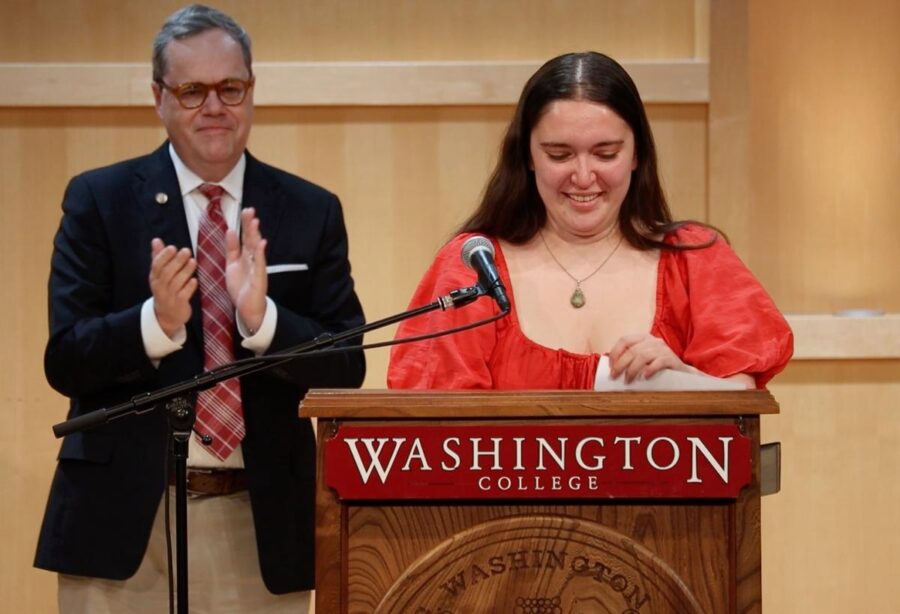Eylie Sasajima ’23 earned the prestigious honor with a portfolio of poems, academic work and creative non-fiction.
The Prize caps a college career that included editing Collegian, Washington College’s student-run literary and art journal; serving as a poetry reader for the College’s national literary magazine, Cherry Tree; and conducting research as an English major on Frank Herbert’s Dune.
During the award ceremony Friday night, Sasajima, from Spring Grove, Pennsylvania, read several poems from her prize-winning portfolio, which she said she had curated with a conscious focus on assembling a manuscript, using the process of applying for the Sophie Kerr Prize as an opportunity to not only showcase her diverse writing, but also to strive to make the portfolio overall coalesce as a larger work.
“Poetry is the genre that I really speak best through. My goal for college was always to grow and mature as a poet,” Sasajima said. “I am right now looking at a career in editing and publishing. Something I’m thinking a lot about is putting together manuscripts.”
Sasajima began working as an editorial intern at Alan Squire Publishing of Bethesda during her last semester and will continue working there after graduation. Liz O’Connor, associate professor of English and acting chair of the department, said that is more of a continuation of Sasajima’s literary career than the beginning of it.
With her work for Collegian and Cherry Tree, as well as her scholarly work and writing, Sasajima has shown “substantial engagement in the literary community of Washington College,” according to O’Connor, and the broad approach to literary endeavors shows through in her poetry.
“In Eylie Sasajima’s poetry, the Sophie Kerr Committee recognized a young writer’s promising creative talents guided by critical acumen as an editor and intellectual engagement with the issues interrogated in the writing. In explorations of climate change, identity, gender, and power, Sasajima deftly translates between the ecologies of the self and the larger communities of our natural and social environments,” O’Connor said. “Eylie Sasajima is a poet and thinker worthy of our attention.”
Sasajima’s thoughtfulness is apparent when she discusses her work as well. Across the genres represented in her portfolio, Sasajima noted that the work deals with themes of gender, apocalypse, and home, including her homeplace of south-central Pennsylvania and her Japanese American heritage. Throughout the topics she addresses, Sasajima sees complexity, danger but also beauty, conflict but also pride.
James Hall, associate professor of English and director of the Rose O’Neill Literary House, serves on the selection committee that reviews student submissions and awards the Sophie Kerr Prize. He saw that complexity, as well as a special rigor and drive in Sasajima’s work.
“Eylie Sasajima’s poems explore the self in our modern world, confronting topics like climate change and oppression that are far-ranging and deeply impressive. As impressive as her writerly vision is the craft of her work: the attention to well-deployed imagery, to meaningful and burnished sonic textures, to poetic form that highlights and develops the wise intellectual and emotional arguments—these are all characteristics of an Eylie Sasajima poem,” Hall said. “And while Sasajima questions what it means to have a self shaped by socio-political powers, she also believes that poetry can restore the world’s beauty: to take from the ruins and build something better.”
While Sasajima won the Sophie Kerr Prize, both Hall and O’Connor noted the overall excellence and versatility of this year’s entrants, especially the five finalists, who also included Queen Cornish of Wilmington, Delaware; A.J. Gerardi of Wayne, Pennsylvania; Sophia Rooks of Williamsburg, Virginia; and Amara Sorosiak of New Milford, Connecticut.
“It was very difficult to narrow down to five finalists,” Hall said. “Reading these finalists’ work is to recognize how good writers draw from every genre and manage to mix in their own imagination to make the world feel new.”
After President Mike Sosulski announced that Sasajima had won the Sophie Kerr Prize, the other finalists turned to her with smiles and encouragement as she covered her mouth then rose to speak. Her remarks accepting the prize were heartfelt expressions of gratitude that reflected the importance of community in the Sophie Kerr tradition.
“This is an honor I never really expected for myself. and I can’t really put my gratitude into words. But I will try. Thank you to the Sophie Kerr committee for the support and for considering my work. I’m just so indebted to the English faculty here and to the Lit House staff. So thank you to all of them for their guidance, for their mentorship and for their support,” Sasajima said. “Amara, A.J., Sophia, and Queen are such amazing writers who exemplify how strong our literary community here is. And I certainly wouldn’t be here without some other members of that community…who made me feel welcome here and who are pretty wonderful writers who I look up to.”



Write a Letter to the Editor on this Article
We encourage readers to offer their point of view on this article by submitting the following form. Editing is sometimes necessary and is done at the discretion of the editorial staff.